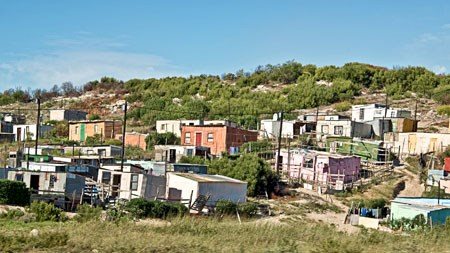Last week when Tito Mboweni took the microphone and announced an interest rate cut of 1%, hard pressed bond holders breathed a sigh of relief.
Estate agents did too, but they’re a hard bunch to please and most of them say the Governor of the SA Reserve Bank didn’t go far enough.
On a bond of R1 million the rate cut would save R1000 a month, but estate agents say it will take a lot more than 1% to heat the property market up.
Property Finance Consultant “The Bond Man” seemed quite chuffed. “Rates went up 10 times in the past 2 years, so this rate cut (the second in the current cycle) was good news for both consumers and the property industry. This is the first time I can remember rates having dropped by a full one hundred basis points, instead of only 50”, says Gary Peterson of The Bond Man.
Though positive about what this might mean for the market, The Bond Man isn’t exactly bracing himself for an onslaught of inquires as a result of the 1% cut. But he says he is dealing with many more prospective buyers who have asked to be pre-qualified. “The banks no longer pre-qualify their clients, and most mortgage originators couldn't be bothered. I've always welcomed the chance to pre-qualify prospective buyers, because they invariably come back to me to do their bond, once they've found the right property”.
Another commentator described the decision adopted by Mboweni and the Reserve Bank’s Monetary Policy Committee as “hawkish”, saying it should have taken a more interventionist stance like the United States of America, Australia and the United Kingdom where interest rates have been slashed.
Simon Stockley, the CEO of mortgage lender Integer, says the major effect of the cut is one of sentiment, although practically it will help with bond repayments. “The Governor has sent a clear message to the market that whilst there are still some threats, he expects the interest rate cycle to ease. This is likely to help those customers who are under financial strain to maintain their monthly instalments, and entice speculators back into the market on the basis that the cycle may well have bottomed.”
Stockley says he’s not expecting a huge pickup in volume but rather a period of consolidation and a careful risk management. “All lenders are currently managing liquidity positions carefully, as well as closely watching arrears and endeavoring to assist customers to weather this financial storm. “We have responded to the crisis far better that other jurisdictions – say the USA or the UK – and the recent rate cut will help strengthen the basically sound fundamentals of the sector.”
Estate agents say a recovery in the local property market is only on the horizon. Kevin Penwarden, CEO, SA Home Loans for says the immediate effect of the interest rate cut will be a measure of relief to the hard-pressed consumers who are struggling to service debt. “The prime rate of interest has reduced from 15.5% at the beginning of December 2008 to 14%. On a typical R750,000 home loan over 20 years, this fall of 1.5% would represent a reduction in monthly installments of R827."
This clearly is meaningful to the wallet of the consumer. However one must bear in mind that the consumer was hit by a surge of interest rate increases totaling 5% over a fairly short period of time. “Over and above this there were several inflation shocks from huge increases in municipal rates, electricity, food and of course fuel, although the latter has thankfully dissipated significantly from its highs.”
Penwarden says another factor worsening the plight of the consumer is the extent of their credit burden ranging from home loans to credit cards, store cards, micro loans, vehicle finance, overdrafts and more. “The bottom line is that whilst the recent interest rate cuts have provided relief there is a long way to go before the consumer will be back in the advantageous affordability position of a couple of years ago. If we get further interest rate reductions, which is expected and there are no more inflation shocks, I believe things will improve in 10 to 12 months.”
Penwarden says there has not been a surge of enquiries for home loans as a result of the interest rate cuts. The economy has a way to go before consumers can afford more credit.
SAHL says it its projection for new home loans business this year remains moderate, compared with levels achieved from 2003 to 2007. But, in spite of this, Penwarden said SAHL still has lots of enquiries. “A level of demand remains, particularly as this has not been satisfied by the banks. Our moderate projections for business growth are based on the scarcity of liquidity and the cost of funds. As a result of both of these factors we are not looking to grow our book in the near term, probably for most of 2009.”
So, it isn’t going to get much better for the property market this year.
But everybody’s circumstances are different. If you have some cash or are risk averse, now is the time to buy.
Peterson of The Bond Man agrees. “If you have a reasonably secure income stream, whether you're salaried or self-employed, and if you can afford to put down a deposit of around 15% of the purchase price – then there’s never been a better time to buy than now. You will also need to make provision for the costs associated with transfer and bond registration. Buyers should ensure that they're properly pre-qualified for a bond even before they start looking around for a property. A pre-qualified buyer is taken more seriously by estate agents and sellers alike, and having sorted out their finance upfront gives buyers more bargaining power when it comes to closing a deal”.
Saul Geffen, the CEO of ooba, advises those thinking of buying property to consider buying this year as the market is soft now and sellers are more likely to negotiate. “Sellers who don’t need to sell right now, try holding onto your home until demand picks up later in the year. Property is still one of the safest investments to make and we expect the next upward cycle to begin in the second half of 2009.”


